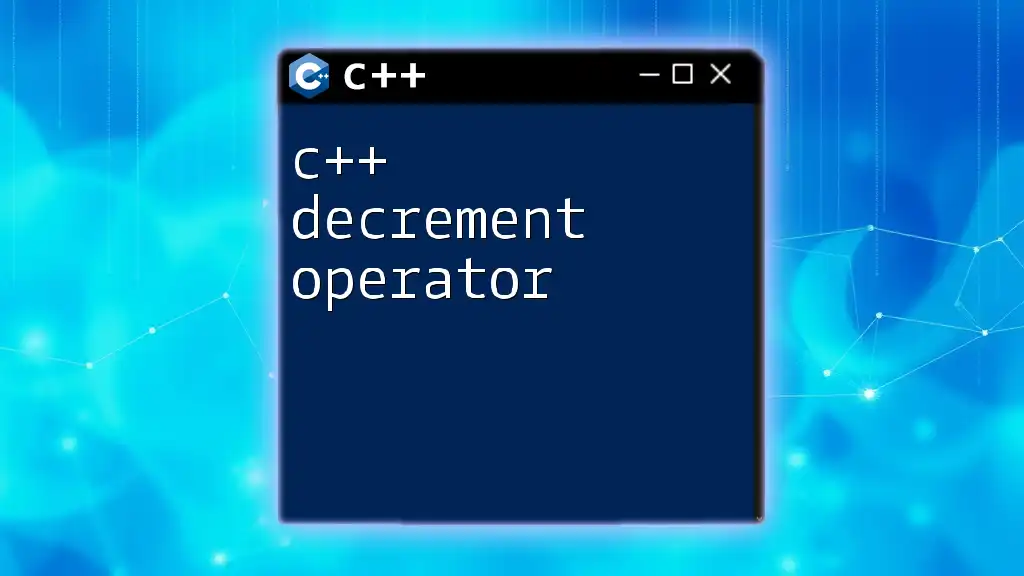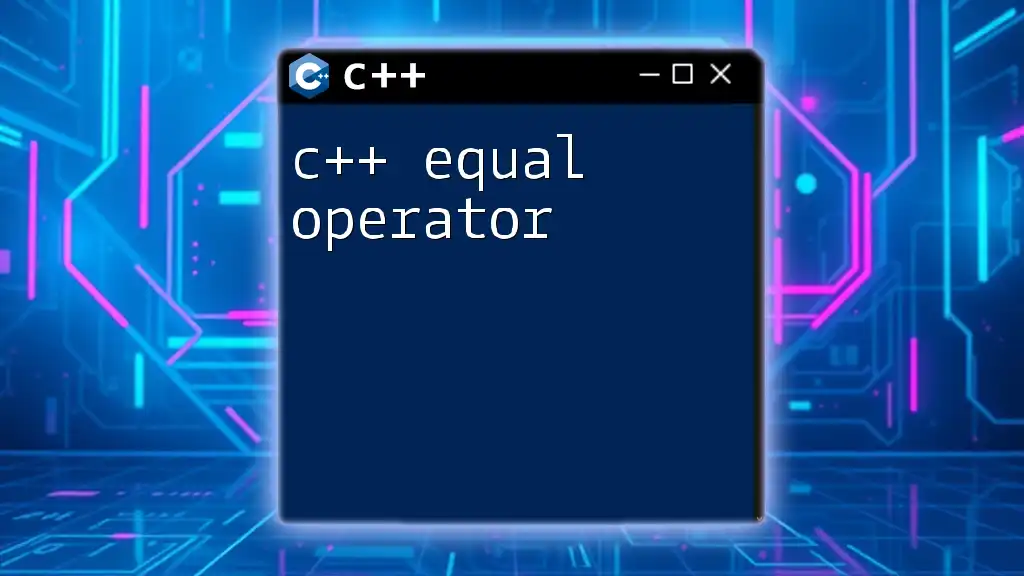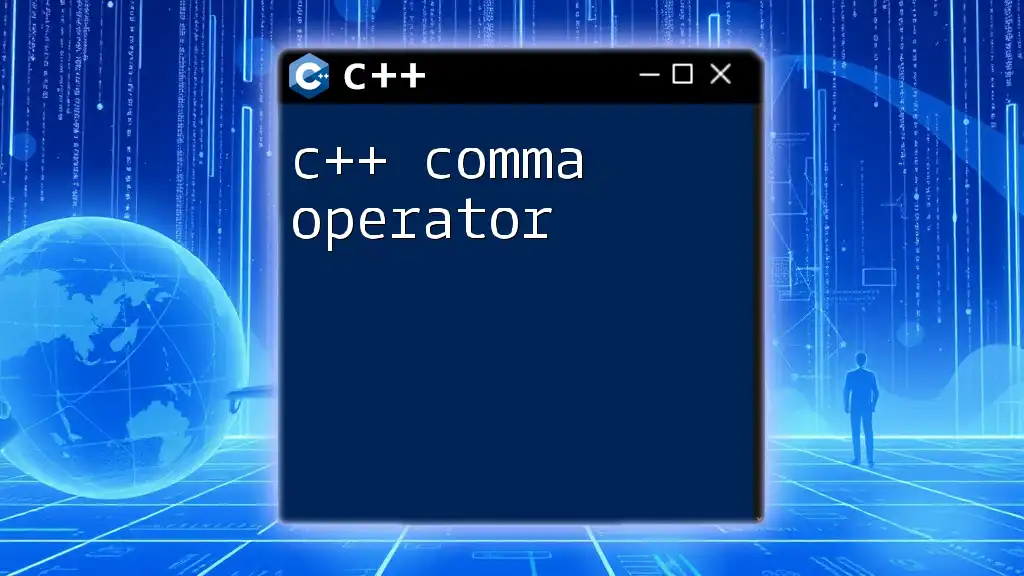In C++, the exponential operator is not built-in; however, you can achieve exponentiation using the `pow()` function from the `<cmath>` library, which raises a base number to the power of an exponent.
Here's a code snippet demonstrating its usage:
#include <iostream>
#include <cmath>
int main() {
double base = 2.0;
double exponent = 3.0;
double result = pow(base, exponent);
std::cout << base << " raised to the power of " << exponent << " is " << result << std::endl;
return 0;
}
Understanding the C++ Exponential Operator
What is the Exponential Operator?
The C++ exponential operator refers to techniques for performing exponentiation operations, allowing you to raise a base to a specified power. In contrast to many programming languages that offer a dedicated operator for exponentiation, C++ does not include a built-in operator like `**`. Instead, the C++ standard library provides the `pow()` function, which is designed for this purpose.
From a mathematical viewpoint, exponentiation involves taking a base number and raising it to the power of an exponent. For example, raising 2 to the power of 3 (written as \(2^3\)) results in 8.
Why Use the Exponential Operator in C++?
The C++ exponential operator plays a crucial role in various real-world applications. In scientific calculations, finance, computing algorithms, and more, exponentiation serves as a fundamental concept. Its applications can be widely seen in:
- Physics: Calculating power, energy, and other physical properties that follow exponential growth.
- Finance: Determining compound interest, where the investment’s growth rate can be modeled using exponentiation.
- Computer Science: In algorithms related to data structures, cryptography, and complexity analysis.
The Basics of Exponentiation in C++
C++ provides the `pow()` function in the `<cmath>` header file. This function allows you to perform exponentiation efficiently without the need for a dedicated operator.
Using the Pow Function
The `pow()` function is defined as follows:
double pow(double base, double exponent);
This function takes two arguments: the base and the exponent, and it returns the result as a double.
Example of Basic Usage
Consider the following example to understand how the `pow()` function can be used:
#include <iostream>
#include <cmath> // Required for pow()
int main() {
double result = pow(2, 3); // 2^3 = 8
std::cout << "2 raised to the power of 3 is: " << result << std::endl;
return 0;
}
In this code snippet, we utilize the `pow()` function to calculate \(2^3\), yielding an output of 8. This simple invocation showcases the functionality of the exponential operator in C++.
Working with Different Data Types
The `pow()` function can accept various data types, but there are nuanced differences when dealing with integers and floating-point numbers.
Example with Integer Exponent
You can use the `pow()` function with integer values as base and exponent:
int main() {
int base = 4;
int exponent = 2;
double result = pow(base, exponent);
std::cout << "4 raised to the power of 2 is: " << result << std::endl; // Outputs 16
return 0;
}
Here, we calculate \(4^2\) using integers, and the output is 16. C++ automatically converts the integers into doubles for the computation.
Example with Floating-point Base
The `pow()` function can also handle floating-point bases:
int main() {
double base = 2.5;
double exponent = 3;
double result = pow(base, exponent);
std::cout << "2.5 raised to the power of 3 is: " << result << std::endl; // Outputs 15.625
return 0;
}
In this example, \(2.5^3\) results in 15.625. This illustrates that the `pow()` function works seamlessly with double values.
Common Mistakes and How to Avoid Them
While using the C++ exponential operator, there are a few common pitfalls that programmers should be aware of:
-
Using Incorrect Headers: Always ensure that `<cmath>` is included at the top of your program; otherwise, you will encounter compilation errors related to the `pow()` function.
-
Integer Division Pitfalls: Remember that if both the base and exponent are integers, the division rules apply. For instance:
int base = 5;
int exp = 2.5; // Error: exponent should be a double
double result = pow(base, exp); // This code might compile but gives unexpected results
Using non-integer values without proper type casting may lead to surprising outcomes or runtime errors.
Advanced Usage of Exponential Operator
Handling Negative Exponents
Exponentiation also allows for negative exponents, which mathematically represents the reciprocal of the base raised to the absolute value of the exponent. For instance, \(2^{-3}\) equals \(\frac{1}{2^3}\).
Example of Negative Exponent
int main() {
double base = 2;
double exponent = -3;
double result = pow(base, exponent);
std::cout << "2 raised to the power of -3 is: " << result << std::endl; // Outputs 0.125
return 0;
}
Here, we calculate \(2^{-3}\), yielding an output of 0.125, which confirms that the function successfully handles negative exponents.
Performance Considerations
When using the `pow()` function, performance must be taken into account, especially for large exponent values. The `pow()` function utilizes algorithms that can be more computationally intensive than standard multiplication.
How Pow Differs from Direct Multiplication
Directly multiplying the base can be faster in cases where the exponent is a small integer. For example, instead of using `pow(base, exponent)`, you can write a simple loop to calculate the power:
int main() {
int base = 2;
int exponent = 10;
int result = 1;
for(int i = 0; i < exponent; i++) {
result *= base;
}
std::cout << "2 raised to the power of 10 is: " << result << std::endl; // Outputs 1024
return 0;
}
In this snippet, we manually calculate \(2^{10}\) using a loop, which is efficient for small numbers.
Alternatives to Pow() in C++
While `pow()` is a powerful function for general exponentiation, there are alternative methods for specialized cases:
Using Bitwise Operators for Integer Powers
For powers of 2, you can make use of bitwise shifting, which is much faster than using `pow()`:
int main() {
int result = 1 << 5; // Equivalent to 2^5
std::cout << "Result of 2 raised to the power of 5 using bitwise shift is: " << result << std::endl; // Outputs 32
return 0;
}
This example showcases how bitwise operators offer a fast alternative for calculating powers of 2, returning 32 when computing \(2^5\).
Using Custom Exponentiation Functions
In scenarios that require extensive use of specific exponentiation calculations, developers can write their own reusable functions. For example, creating a recursive or iterative function can simplify these computations within larger applications.
Conclusion
In summary, the C++ exponential operator encompasses methods for efficiently performing exponentiation, primarily via the `pow()` function found in `<cmath>`. Understanding how to effectively use exponentiation, working with different data types, and recognizing common pitfalls are essential for any C++ programmer. By leveraging these techniques, developers can incorporate advanced mathematical calculations into their applications seamlessly.
Additional Resources
For further exploration of exponentiation in C++, check the following resources:
- [C++ Standard Library Documentation](https://en.cppreference.com/w/cpp)
- [Math Library Documentation for C++](https://en.cppreference.com/w/cpp/numeric/math)

















